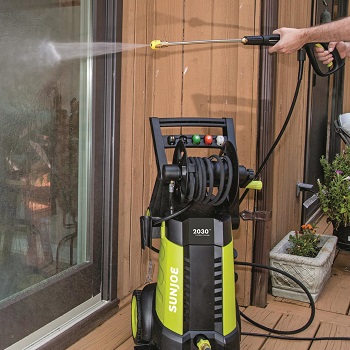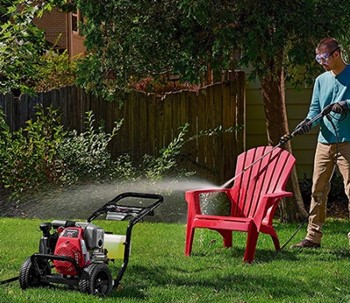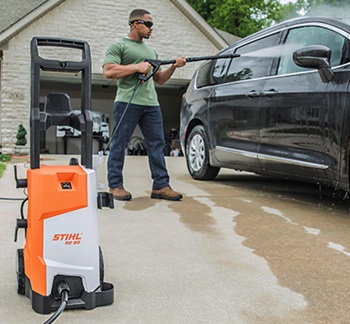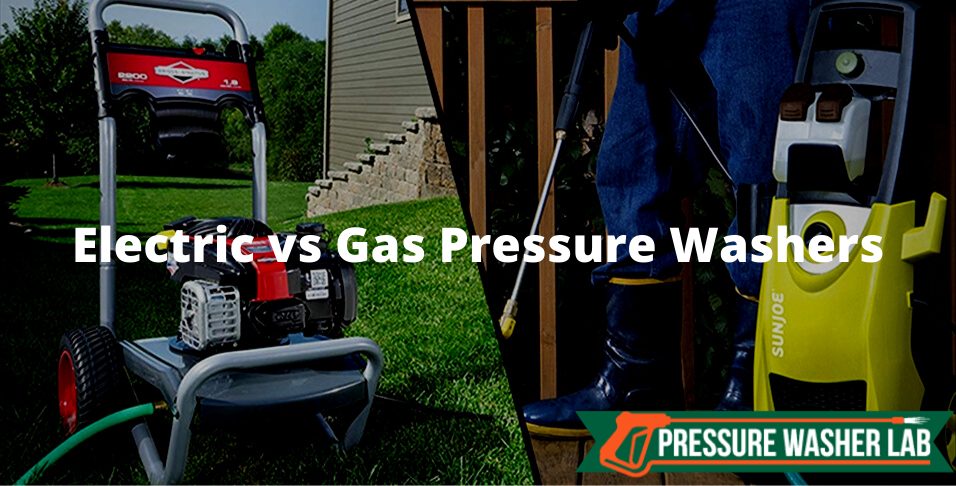Gas pressure washers come with higher power levels than electric pressure washers and offer more mobility due to the lack of power cords and outlets that electric pressure washers require. While electric pressure washers are quieter and more affordable, gas pressure washers are compatible with a wide variety of attachments. Electric pressure washers are safer and have lower maintenance costs than gas pressure washers, but are not as durable.
Comparison Factors for Choosing Gas or Electric Pressure Washers
1. Power Ratings
 The cleaning power of pressure washers is measured in cleaning power (CP) that offers information about the efficiency of the pressure washer. They are calculated by taking into account the pounds per square inch, in short, PSI, and the gallons per minute value or GPM. PSI is an indicator that measures the ability of a pressure washer to detach the dirt from a surface, and the GPM measures how efficiently a pressure washer can wash the removed particles away from the surface. CP is calculated by multiplying the two.
The cleaning power of pressure washers is measured in cleaning power (CP) that offers information about the efficiency of the pressure washer. They are calculated by taking into account the pounds per square inch, in short, PSI, and the gallons per minute value or GPM. PSI is an indicator that measures the ability of a pressure washer to detach the dirt from a surface, and the GPM measures how efficiently a pressure washer can wash the removed particles away from the surface. CP is calculated by multiplying the two.
Gas pressure washers are more powerful and have a CP value between 5280 and 16000, while the CP value of electric power washers is between 1000 and 3200.
Compared to electric pressure washers, gas pressure washers also come with higher PSI levels and can deliver a pressure between 2000 and 4900 PSI, while electric pressure washers stay in a range between 1000 and 2400 PSI.
Electric pressure washers will easily clean a car, while a gas pressure washer is more appropriate for cleaning concrete surfaces or for a construction site. A car clean requires between 1200 and 1900 PSI, concrete needs at least 3000 PSI to be cleaned properly, and cleaning a construction site requires at least 3200 PSI.
2. Water Flow Ratings
Water flow ratings of pressure washers are measured in GPM and have a high influence on the efficiency of a pressure washer.
Compared to electric pressure washers, gas pressure washers have a higher water flow rating. The GPM values of gas pressure washers range from 1 to 4, while electric pressure washers have GPMs between 1 and 1.6.
Gas pressure washers that have more PSI can be less effective than models with fewer PSI and a higher water flow. A pressure washer with 4000 PSI and 2 GPM has 8000 CU, while a pressure washer with 3000 PSI and 3.5 GPM has 10500 CU.
3. Cost of Purchase
The cost of purchase of an electric pressure washer is lower compared to a gas pressure washer. The prices of electric pressure washers range from around $50 up to $3000, while gas pressure washers cost between $300 and $10500.
The cost of a pressure washer is influenced by its efficiency, utility, and the materials it is made of. Electric pressure washers are mostly made of plastic. As a result, they are cheaper than gas pressure washers, which have multiple components made of metal.
Electric pressure washers are designed for home use while gas pressure washers can easily be used for heavy-duty cleaning due to their higher power, a feature that makes them more expensive.
4. Maintenance Costs
The maintenance costs of electric pressure washers are close to none compared to gas pressure washers. Servicing a gas pressure washer can cost up to 200$ – 300$, but it can be cheaper if users know how to perform some maintenance tasks themselves.
The maintenance of gas pressure washers requires more money because they need regular oil replacement, which has to be performed after 12 weeks of use. The air filters need to be replaced or cleaned and soaked in oil after 50 hours of use. Spark plugs should also be replaced twice a year or after around 100 hours of use.
Gas pressure washers also need constant gasoline and fuel stabilizer supply. The pumps need to be taken care of regularly if they are used often at temperatures below 32 degrees Fahrenheit, and might even need to be changed. Even if a gas pressure washer seems to be working properly, most manufacturers recommend regular professional check-ups.
5. Durability
The durability of a pressure washer is given by the quality of its components, and also by the use frequency and duration.
Compared to electric pressure washers, gas pressure washers are considerably more durable. The life expectancy of an electric pressure washer is around 500 hours of use because they are mostly made of plastic. The life expectancy of a gas pressure washer can go up to 10 years and even higher with proper maintenance.
Gas pressure washers have a longer life expectancy because their main components can be replaced, while the components of electric pressure washers are not interchangeable or replaceable.
6. Operating Distance
 Compared to gas pressure washers, which do not restrict the mobility of the user, electric pressure washers provide a smaller operating distance. Gas pressure washers have an advantage over electric pressure washers for projects that are further away from the house like decks, fences, gazebos, patios, pools, or animal shelters.
Compared to gas pressure washers, which do not restrict the mobility of the user, electric pressure washers provide a smaller operating distance. Gas pressure washers have an advantage over electric pressure washers for projects that are further away from the house like decks, fences, gazebos, patios, pools, or animal shelters.
Electric pressure washers have a smaller operating range than gas power washers because the length of the cord limits the distance at which a user can maneuver the electric pressure washer. The use of an extension cord for an electric pressure washer is not recommended because it will reduce its lifespan. The placement of the power outlets can also limit the mobility of the electric pressure washer. Even if some electric pressure washers work on rechargeable batteries, their power is limited.
7. Noise Level
Gas pressure washers are by far noisier than electric pressure washers. The noise level of a pressure washer can become a problem for people who use it without protection. Workers in the cleaning field have to use protective gear for their auditory system.
The hearing health of a person is threatened when they are exposed to noises that are above 85 decibels, which resemble the sound of city traffic while driving a car for a longer period. Compared to an electric pressure washer that has a noise level in the range between 80 and 85 decibels, a gas pressure washer’s noise levels are, on average, around 95 decibels, the same levels that motorcycle engines produce.
Gas pressure washers make more noise than electric pressure washers but it is a small price to pay considering that they provide a considerably higher power compared to electric pressure washers.
8. Variety of Attachments
Compared to electric pressure washers, which are usually compatible with attachments from their own brand, gas pressure washers support a larger variety of accessories.
Gas pressure washers attachments include pressure washer extension wands that are needed to reach confined spots. Telescopic wands can also be attached to gas pressure washers, as well as pressure washer gutter cleaners and rotary brushes. The cleaning capacity of a gas pressure washer can be improved by the use of pressure washer guns. Pressure washer surface cleaners are also an option for gas pressure washers as they can reduce cleaning time even more.
9. Safety
Electric pressure washers are safer compared to gas pressure washers due to their lower power. Regardless of the type of pressure washer, if not used correctly, it can become dangerous.
Gas pressure washers can be hazardous because high pressure can cause users to fall if they are not balanced well. The high PSI of a gas pressure washer can also cause the detachment of parts from the surface that is cleaned, which can physically injure the user and the people in proximity.
While electric pressure washers can harm the user if the cord is damaged, and it touches water, gas pressure washers can become toxic because of their fuel emissions. Carbon monoxide intoxication can occur if gas pressure washers are used indoors, which is not recommended. People who use them on a daily basis, like workers in the cleaning industry, need to wear special protective gear.
10. Time
Electric pressure washers take more time to clean the same surface compared to gas pressure washers because they are less powerful. The cleaning time that a user needs for the same task can be done in half the time with a gas pressure washer.
11. Environmental Effects
 Compared to gas pressure washers, electric pressure washers have zero fuel emissions. This is why they could be considered more eco-friendly. The average amount of energy used by an electric pressure washer is around 1.5 kW per hour, which is the same amount as a portable electric heater and less than a dryer, which uses at least 2 kW per hour. Gas pressure washers use zero electrical energy.
Compared to gas pressure washers, electric pressure washers have zero fuel emissions. This is why they could be considered more eco-friendly. The average amount of energy used by an electric pressure washer is around 1.5 kW per hour, which is the same amount as a portable electric heater and less than a dryer, which uses at least 2 kW per hour. Gas pressure washers use zero electrical energy.
Gas pressure washers use a gallon of fuel an hour, on average. Gas power washers also use less water than electric pressure washers because the time needed for a cleaning task is reduced due to their higher power levels. The high power of a gas pressure washer reduces the need for chemical use that can be harmful to the environment, while electric pressure washers might need more detergents to perform deep cleaning.
The environmental effects of pressure washers are surrounded by controversy because both electric and gas pressure washers have ups and downs. Pressure washers are detrimental to the environment to some extent regardless of the type because the use of electricity and the fuel emissions are both harmful, but are safer than regular cleaning due to less water and chemicals used.
12. Need For Soaps and Detergents
Due to their high power, gas pressure washers need fewer amounts of chemicals to clean well than electric pressure washers, which require more soaps and detergents to provide clean surfaces.
Gas pressure washers can clean various types of surfaces without any detergents due to their high power but there are times when chemicals are needed for thorough cleaning.

